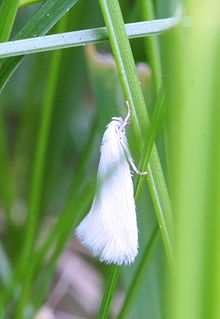Related Research Articles

Aoraia is a genus of moths of the family Hepialidae. There are 13 described species, all endemic to New Zealand. The type species of this genus is Porina dinodes Meyrick, 1890. This genus contains some large species with a wingspan of up to 150 mm.

Cydia is a large genus of tortrix moths, belonging to the tribe Grapholitini of subfamily Olethreutinae. Its distinctness from and delimitation versus the tribe's type genus Grapholita requires further study.
Cyme is a genus of moths in the family Erebidae. The genus was described by Felder in 1861.

Brachmia is a genus of the twirler moth family (Gelechiidae). Among these, it is mostly placed in the subfamily Dichomeridinae.
Licnoptera is a monotypic moth genus in the family Erebidae. Its only species, Licnoptera crocodora, is found in New Guinea. Both the genus and species were described by Edward Meyrick in 1889.

Scoliacma is a genus of tiger moths in the family Erebidae. The genus was erected by Edward Meyrick in 1886.
Tylanthes is a monotypic moth genus in the subfamily Arctiinae. Its only species, Tylanthes ptochias, is found in Australia and New Guinea. It is found in both lowland and highland habitats. Both the genus and species were first described by Edward Meyrick in 1889.
Piletocera is a genus of moths of the family Crambidae. The genus was first described by Julius Lederer in 1863.

Anatrachyntis is a genus of moths in the family Cosmopterigidae. Some authors include it in Pyroderces.

Cosmopterix is a large genus of moth in the family Cosmopterigidae.

Macrobathra is a genus of moths in the family Cosmopterigidae. Most species are endemic to Australia.

Archyala is a genus of moths belonging to the family Tineidae. This genus is endemic to New Zealand. Archyala was first described by Edward Meyrick in 1889.
Miaromima is a genus of moths of the family Nolidae. The genus was erected by Edward Meyrick in 1889.

The Depressariinae – sometimes spelled "Depressiinae" in error – are a subfamily of moths in the superfamily Gelechioidea. Like their relatives therein, their exact relationships are not yet very well resolved. It has been considered part of family Elachistidae sensu lato or included in an expanded Oecophoridae. In modern classifications they are treated as the distinct gelechioid family Depressariidae.

Elachista is a genus of gelechioid moths described by Georg Friedrich Treitschke in 1833. It is the type genus of the grass-miner moth family (Elachistidae). This family is sometimes circumscribed very loosely, including for example the Agonoxenidae and Ethmiidae which seem to be quite distinct among the Gelechioidea, as well as other lineages which are widely held to be closer to Oecophora than to Elachista and are thus placed in the concealer moth family Oecophoridae here.

Agonopterix is a moth genus of the superfamily Gelechioidea. It is placed in the family Depressariidae, which was often – particularly in older treatments – considered a subfamily of the Oecophoridae or included in the Elachistidae.

Autosticha is a genus of gelechioid moths. It belongs to the subfamily Autostichinae, which is either placed in the concealer moth family (Oecophoridae), or in an expanded Autostichidae. It is the type genus of its subfamily. Originally, this genus was named Automola, but this name properly refers to a fly genus in family Richardiidae.
Chlorogenia cholerota is a moth of the subfamily Arctiinae first described by Edward Meyrick in 1889. It is found in New Guinea.

Eretmocera is a genus of moths in the family Scythrididae.

Eutorna is a genus of gelechioid moths.
References
- ↑ Savela, Markku (October 27, 2015). "Chlorogenia Meyrick, 1889". Lepidoptera and Some Other Life Forms. Retrieved October 17, 2019.
- ↑ Pitkin, Brian & Jenkins, Paul (November 5, 2004). "Chlorogenia Meyrick, 1889". Butterflies and Moths of the World. Natural History Museum, London . Retrieved September 12, 2020.
| Wikimedia Commons has media related to Chlorogenia . |
| Wikispecies has information related to Chlorogenia |
| This Lithosiini-related article is a stub. You can help Wikipedia by expanding it. |